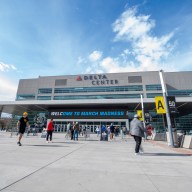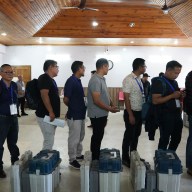By Reade Levinson and Kristina Cooke
(Reuters) – The U.S. immigration agents who arrested Armando outside his Ohio home last fall would have had little trouble finding him: He had provided his address and fingerprints weeks earlier in a bid to get his 15-year old son out of government custody.
The boy, Bryan, was apprehended in July after fleeing political violence in Nicaragua and crossing the southern border illegally. Armando, who is living in the U.S. illegally, wrestled with the risk of coming forward, especially as he had been deported before.
“I knew if I did the fingerprints, they could find me,” said Armando, 35, who has been imprisoned in Ohio on an illegal re-entry charge for five months. He spoke on condition that his last name not be used for fear of being targeted by a pro-government militia if deported to Nicaragua.
“I was ready to do anything for my son,” Armando said.
Armando and his attorneys contend that authorities found him with the information he supplied. Federal immigration officials would not say how he was found.
If Armando is correct, he was a victim of bad timing. Earlier this month, a federal spending bill was signed into law that generally bars officials from using information gathered to vet children’s sponsors to target them for arrest and deportation.
The new restriction, the latest see-saw in U.S. immigration policy, likely comes too late for at least 170 potential sponsors who were arrested since last spring based on the information they supplied. That’s when the Department of Health and Human Services (HHS), which has custody of migrant children, began exchanging information about sponsors with the Department of Homeland Security (DHS), which enforces immigration laws.
A DHS official, who declined to be identified, said the number of sponsors arrested was a “drop in the bucket” compared to the tens of thousands of arrests by immigration authorities each year.
Immigrant advocates welcomed the limit on use of shared information but said it couldn’t reverse the damage done to families. Nor would it necessarily reassure potential sponsors, they said.
They noted that the provision is in a spending law that expires in September and that, in the meantime, the two agencies wouldn’t stop exchanging information. HHS said it continues to work with DHS as part of its vetting process to ensure child safety.
People who favor restricting immigration said the new provision hampers the government’s ability to enforce immigration law.
Sponsors get “this force field of protection” around them, said Mark Krikorian, executive director at the Center for Immigration Studies. “A statutory prohibition is inexcusable.”
LOCKED UP LONGER
The controversy has been brewing since April, when an agreement to share information about sponsors was signed between the health and immigration agencies.
Advocates for migrant children said the policy could be psychologically harmful to youngsters and intimidate sponsors.
“The real problem with the information sharing is not just that it has resulted in people being deported but that the specific design of it is to dissuade sponsors from coming forward, thereby keeping kids locked up for longer,” said Simon Sandoval-Moshenberg, an attorney for the Legal Aid Justice Center.
The average length of time children spent in HHS custody was 89 days in the first quarter of fiscal year 2019, compared to 60 days in all of fiscal year 2018 and 41 days in fiscal 2017, HHS data show.
The Lutheran Immigration and Refugee Service, which runs two-thirds of digital fingerprinting sites for HHS’ Office of Refugee Resettlement, took prints for approximately the same number of direct sponsors in December as in March, according to the service’s data, even though twice as many children were in government custody by then.
Sandoval-Moshenberg said that the new legislation is unlikely to change sponsors’ reluctance to make their presence known to authorities. “I don’t think this (law) solves that,” he said.
‘THEY NEED ME’
A mechanic with four young American children, Armando was first deported at age 19 when he admitted to authorities in a Miami airport that he had flown into the country using someone else’s passport.
He illegally crossed the border again in 2011 and had been living in Ohio with his fiancée and children. In June, as conditions worsened in Nicaragua, Bryan left to join his father in America. After being caught at the border, he was sent to a U.S. government children’s shelter.
Bryan’s caseworker told Armando that his son’s release would be delayed without a biological parent on the application, Armando said.
In August, Armando and his family drove seven hours to visit Bryan at a facility in upstate New York. Before and after the visit, Bryan asked repeatedly if he could leave with his family, according to caseworker notes shared with Reuters.
He was told it wasn’t possible because the required fingerprints were still being processed, according to the notes. At the time, every adult household member had to give prints, creating an overall backlog, although that policy was dropped in late December.
The caseworker notes indicated Bryan was allowed to call his family in Akron once a week – for 10 minutes – and that he said he had trouble sleeping. Later, he was moved to a tent city in Texas, 1,700 miles from his father’s home.
A month after Armando visited Bryan in August, he said, three black SUVs pulled up outside his Akron home. Immigration agents handcuffed him as his fiancée and children watched, Armando said.
“I pray every day, especially for my kids,” he said during an interview at the Youngstown, Ohio, prison where he is being held. “They need me.”
Just before Christmas, after 4 months and 17 days in custody, Bryan was released to Armando’s fiancée, Heather Barahona, an American citizen.
Days afterward, he and Barahona drove to see Armando. Father and son pressed their hands together against the Plexiglas barrier. They had effectively traded places.
Bryan blames himself. The night after visiting his father, he told Barahona: “If I hadn’t come across, none of this would have happened.”
(Editing by Julie Marquis)


















